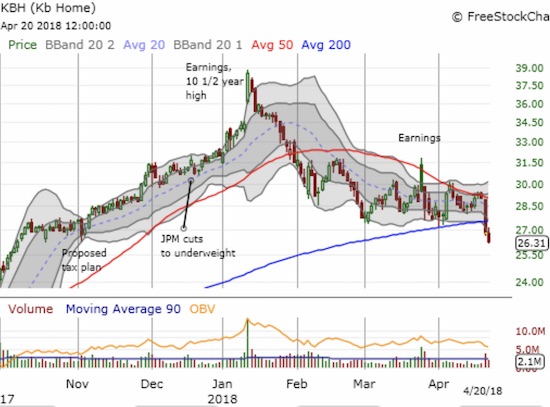For the second time in a row, KB Home (KBH) is struggling to benefit from a strong earnings report. In January, investors rushed into the stock post-earnings only to create a massive blow-off top. In March, sellers started fading the stock on the same day of the initial post-earnings pop. Last week, KBH broke down below its 200-day moving average (DMA) and confirmed the bearish move on the following day. KBH last traded below this critical trend line almost two years ago in May, 2016.

Source: FreeStockCharts.com
Investors are ignoring the strong results. They are ignoring management’s insistence that the company has a handle on soaring lumber and labor costs. They do not care that management thinks the economy has sufficient strength to accommodate slowly rising rates – from the conference call: “we have yet to see a change in home buying behavior…we’re not seeing any impact yet to the customer”. Investors are suspicious that home buyers will continue scrambling to buy homes in a supply-constrained market – from KBH: “we were able in the quarter to successfully push price and hold up a solid sales pace through the quarter”. These are the only conclusions I can make when contrasting the strong earnings results with the poor stock performance. If management understands better what is going on than investors, then there is huge upside opportunity in KBH here. However, I have looked at KBH as a fresh opportunity almost since it filled the January post-earnings gap up. I now have to respect the bearish trading action with the 200DMA breakdown.
Here are some of the best highlights from the earnings report with comparisons to the first quarter 2017 results:
- Total revenues +6% to $871.6 million.
- Homebuilding operating income +74% to $44.0M.
- Homebuilding operating income margin +200 basis points to 5.1%.
- Total pretax income +115% to $46.0M.
- Excluding a one-time charge, adjusted net income was $39.9M ($.40 per diluted share), compared to net income of $14.3 million ($.15 per diluted share).
- Ending backlog value grew 10% to $1.97 billion, with all regions posting year-over-year increases – KBH’s highest backlog value in over 10 years.
One of the more notable caveats was flat deliveries at 2,223 homes. On a regional basis, net orders in the West declined 2% (a year ago they soared 49%), and Texas saw a slowdown at higher price points (an on-going theme across home builders).
KBH offered the following guidance during the conference call (from the Seeking Alpha transcript):
- 2Q housing revenues ranging from $990M to $1.05B
- Narrowed full year revenue guidance to $4.55B to $4.85B
- 2Q operating margin, excluding the impact of any inventory-related charges, from 5.9% to 6.4%. Full year from 7.4% to 8.0%, an increase from January’s guidance.
- Assuming no inventory-related charges, 2Q housing gross profit margin increase to 16.8% to 17.2%. Full year gross margin, also excluding inventory-related charges, increased to the range of 17.4% to 17.9% (50 to 100 basis points above 2017).
The confidence in this guidance partially comes from the tremendous backlog on the company’s books. A lot of the company’s costs are also locked in due to that backlog.
There were some other key highlights from the conference call:
First-timers
- Buyers aged 25 to 34 were about one-third of deliveries in each of the last two years and in the first quarter of 2018. Yes, millennials are buying homes.
- Fifty percent of total deliveries went to first-time buyers in Q1 which is consistent with the 5-year average for KBH.
Spring selling season: “The spring selling season is off to a strong start. Net order value increased 8% to $1.2 billion on an 8% increase in net orders.”
Balance Sheet: “We have much more flexibility than we’ve had at any point in probably the last eight or 10 years as a company and liquidity and positive cash flow coming out of the operations…”
On top of KBH’s strong earnings results comes now an ever cheaper valuation. KBH now sports a very attractive forward P/E of 8.4 (trailing P/E of 26.3), price/sales at 0.5, and price/book at 1.2. I will say it again: a price/book ratio of 1.0 is typically considered the bargain basement valuation of builders in the middle of an economic slowdown. In other words, the current trading action and valuation suggests that investors are bracing for a significant slowdown in the housing market. The longer the economy goes without experiencing such a slowdown, the more of a bargain home builders like KBH become.
While I am respecting the bearish trading action here, if KBH dives so deeply as to start reversing the October, 2017 post-earnings move (a 50DMA breakout that took KBH from $22.22/share to $24.12/share), I will go back in to buy with both hands.
Be careful out there!
Full disclosure: long KBH call options
